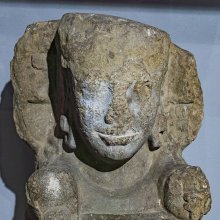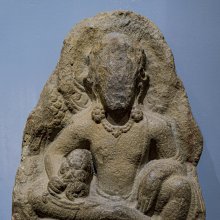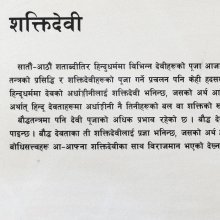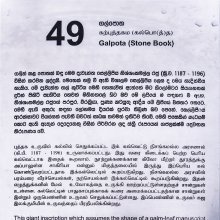Prosperity: 3 definitions
Introduction:
Prosperity means something in Hinduism, Sanskrit, Jainism, Prakrit, the history of ancient India. If you want to know the exact meaning, history, etymology or English translation of this term then check out the descriptions on this page. Add your comment or reference to a book if you want to contribute to this summary article.
Images (photo gallery)
In Hinduism
Shaivism (Shaiva philosophy)
Source: Google books: Genesis and Development of TantraProsperity (in Sanskrit: Puṣṭi) refers to one of the various objectives expected of the Vedic rituals (following the basic pattern of the new and full-moon sacrifice) known as the Kāmyeṣṭis.—to the analysis of W. Caland, the objectives expected of the kāmyeṣṭis are: [e.g., prosperity (puṣṭi)] [...], etc. (Cf. Caland 1908: VI–VII). Although Vedic rituals were a reliable way for the people of ancient India to fulfill their objectives, Tantric rites too claim to bring about the attainment of wishes.

Shaiva (शैव, śaiva) or Shaivism (śaivism) represents a tradition of Hinduism worshiping Shiva as the supreme being. Closely related to Shaktism, Shaiva literature includes a range of scriptures, including Tantras, while the root of this tradition may be traced back to the ancient Vedas.
In Jainism
General definition (in Jainism)
Source: The University of Sydney: A study of the Twelve ReflectionsProsperity is easy to find (as opposed to Wisdom), as discussed in Bhūdhardās’s composition dealing with the twelve reflections (bhāvanā or anuprekṣā), also found in the Tattvārtha-sūtra.—Accordingly, “[...] [eliminating karma]—Follow the five great vows as well as the five mindfulnesses. Conquer the five powerful sense-organs and establish yourself firmly in elimination. (10) [the world]—The Cosmic Man stands fourteen rājus tall. Within him countless souls wander without knowledge. (11) [wisdom is difficult to obtain]—Wealth, prosperity, gold, the pleasures of power—all these are easy to find. What is difficult to get in saṃsāra is the single knowledge that is appropriate. (12) [...]”.

Jainism is an Indian religion of Dharma whose doctrine revolves around harmlessness (ahimsa) towards every living being. The two major branches (Digambara and Svetambara) of Jainism stimulate self-control (or, shramana, ‘self-reliance’) and spiritual development through a path of peace for the soul to progess to the ultimate goal.
India history and geography
Source: Singhi Jain Series: Ratnaprabha-suri’s Kuvalayamala-katha (history)Prosperity (in commerce and trade) in ancient Indian cities was vividly depicted in Kathās (narrative poems), such as Uddyotanasūri in his 8th-century Kuvalayamālā (a Prakrit Campū, similar to Kāvya poetry).—The Kuvalayamala (779 A.D.) is full of cultural material which gains in value because of the firm date of its composition. [...] Page 57.27: There is a vivid description of a commercial prosperity of the city of Pratiṣthāna where rich merchants earned plentiful of gold and jewels.

The history of India traces the identification of countries, villages, towns and other regions of India, as well as mythology, zoology, royal dynasties, rulers, tribes, local festivities and traditions and regional languages. Ancient India enjoyed religious freedom and encourages the path of Dharma, a concept common to Buddhism, Hinduism, and Jainism.
See also (Relevant definitions)
Full-text (+2241): Lakshmi, Samriddhi, Riddhi, Abhyudaya, Pushti, Sampatti, Pravriddhi, Phalasampad, Vriddhi, Sampad, Susampad, Avipad, Nirapad, Kalyana, Vyushti, Rajalakshmi, Vyriddhi, Vivriddhi, Mahodaya, Abhyudayika.
Relevant text
Search found 300 books and stories containing Prosperity; (plurals include: Prosperities). You can also click to the full overview containing English textual excerpts. Below are direct links for the most relevant articles:
Vinaya Pitaka (4): Parivara (by I. B. Horner)
Upāli-Pentads (Division 7: Lying Speech) < [17. Upāli-Pentads]
As To Graduation (5. Pentads) < [7. As To Graduation]
The Banner (Light) of Freedom < [August 1948]
The Economy of Human Life < [October – December, 2007]
Some Aspects of Rural Uplift < [Aug - Sept 1939]
Annadatri-carita (study) (by Sarannya V.)
Dramatic Appraisal of Annadatri-carita (Introduction) < [Chapter 4 - Dramatic Appraisal of Annadatri-carita]
1. Dramatic aspects (a): Vastu (Theme) < [Chapter 4 - Dramatic Appraisal of Annadatri-carita]
1. Social and Economical Aspects in Annadatri-carita < [Chapter 5 - Annadatri-carita—A Critical Study]
The Skanda Purana (by G. V. Tagare)
Chapter 14 - Kuṭuṃbeśvara (kuṭuṃba-īśvara-liṅga) < [Section 2 - Caturaśīti-liṅga-māhātmya]
Chapter 20 - Merit from Gift of Lands < [Section 1 - Veṅkaṭācala-māhātmya]
Chapter 57 - Manifestation of Dhuṇḍhi Vināyaka and Fifty-six Vināyakas < [Section 2 - Uttarārdha]
Kamashastra Discourse (Life in Ancient India) (by Nidheesh Kannan B.)
2. The Puruṣārthas (Introduction) < [Chapter 4 - Positioning Kāma among the Puruṣārthas]
3. Economic Changes in Gangetic Plain < [Chapter 1 - Rise of Urbanization and Luxury Life in India]
4.1. Summary of Kāma-sūtra Book 1: Sādhāraṇa < [Chapter 3 - A Thematic Analysis of Vātsyāyanakāmasūtra]
The Devi Bhagavata Purana (by Swami Vijñanananda)
Related products







